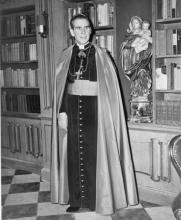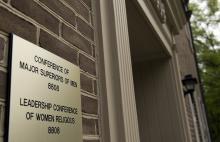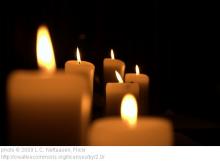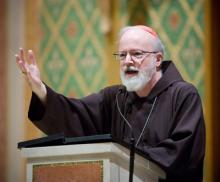vatican
Last month, Sister Pat Farrell, president of the Leadership Conference of Women Religious, traveled to the Vatican to discuss the not-so-favorable assessment of her group.
If you’ll remember, the verdict was that the LCWR – which represents 80 percent of Catholic sisters in the U.S. – undermines Roman Catholic teaching on homosexuality and birth control, while promoting “radical feminist themes.”
Today on WHYY’s Fresh Air, Sister Farrell talks with Terry Gross about how to deal with conflict. She tells Gross that as the sisters prepare for the national assembly in August, they are busy dialoging and gathering perspectives, hoping to “somehow, in a spirited, nonviolent strategizing, look for maybe a third way that refuses to define the mandate and the issues in such black and white terms.”

Influential church historian Diarmaid MacCulloch said he believes Christianity faces a bright future, but predicted the Roman Catholic Church will undergo a major schism over its moral and social teaching.
"Christianity, the world's largest religion, is rapidly expanding — by all indications, its future is very bright," said MacCulloch, 60, professor of church history at Oxford University and an Anglican deacon. His latest book, Silence in Christian History, will be published in the fall by Penguin.
AFTER THE VATICAN’S “hostile takeover” of the Leadership Conference of Women Religious in April, I was particularly struck by one joke I encountered: “Go Catholic ... and leave the thinking to us.”
I laughed—but not much. That one, it seems, is too close to the truth these days.
The Leadership Conference of Women Religious (LCWR), a major educational center for superiors of Catholic women’s religious orders in the U.S., was launched in 1956 at the urging of the Vatican. For years, it has been a venue where officers of every congregation of women religious are invited to meet, study, and consider together the role and place of women religious in the resolution of the issues of the time. Now the LCWR has been put under the control of three bishops: Peter Sartain of Seattle; Leonard Blair of Toledo, Ohio; and Thomas John Paprocki of Springfield, Illinois.
The officers and body of the LCWR—all superiors, prioresses, or other officials of major, longstanding institutions—are no longer authorized to plan its programs, engage its speakers, or create and implement its structures. Instead, Sartain, Blair, and Paprocki have been appointed to oversee the group: to approve its programs, create its constitutions, determine its operational procedures, and define the content of its conferences. As in, “Leave the thinking to us.”
As in, women can’t do it themselves. Or, women aren’t moral agents. Or, women don’t know what they’re doing. Or, the girls need to be controlled. Or, father knows best.

VATICAN CITY — Pope Benedict XVI on Thursday recognized Archbishop Fulton Sheen's "heroic virtues," moving the popular radio and TV evangelist one step closer to sainthood.
Sheen is now "venerable" in the Roman Catholic Church and, if the Vatican recognizes that a miracle has been operated through his intercession, he would be declared "blessed," the last step before sainthood.
The sexual abuse scandal has tarnished the image of the priest and contributed to a crisis of priestly vocations in the Roman Catholic Church, the Vatican said on June 25, while also faulting a widespread “secularized mentality” and parents' ambition for their children, which leaves “little space to the possibility of a call to a special vocation.”
The “Pastoral Guidelines for Fostering Vocations to Priestly Ministry” were prepared over the last seven years by the Vatican's Congregation for Catholic Education.
The document says candidates to the priesthood shouldn't be accepted if they show “signs of being profoundly fragile personalities,” and says future priests should learn the “importance” of their future commitments, “in particular with regard to celibacy.”

When the Nuns on the Bus pulled up in front of Rep. Paul Ryan’s home office in Janesville, Wis., earlier this week, they were challenging the theological rationale he has been using for his budget plan that has become the economic banner for the Republican Party.
But they were also showing how people can hold strong opinions, get those opinions into the public arena and still engage adversaries in respectful ways.
In the process, they called on citizens to get engaged in the same way.
“I urge you, urge you, I beg you, Janesville, in this election cycle, please, don’t be a spectator,” Sr. Simone Campbell pleaded with a crowd in the courthouse park as their visit to the southern Wisconsin city came to an end.
Relations between the Vatican and the American nuns who are under investigation seem to be worsening after the sisters said on June 18 that initial discussions with Rome about a resolution to their standoff were “difficult” and that comments by several U.S. bishops have not made negotiations easier.
The statement by the board of the Leadership Conference of Women Religious, as well as subsequent remarks by the nun who heads the LCWR, may herald a longer and broader struggle inside the church.
“We have never considered ourselves in any way unfaithful to the church, but if questioning is interpreted as defiance, that puts us in a very difficult position,” Sister Pat Farrell, head of the LCWR, said in an interview with the National Catholic Reporter on Monday.

Leaders of an umbrella group that represents the majority of U.S. nuns met with top Vatican doctrinal officials on June 12 in an atmosphere of “openness and cordiality,” according to a Vatican statement.
Still, the Vatican made clear that the Leadership Conference of Women Religious — which represents most of America's 57,000 nuns — "remains under the supreme direction of the Holy See" and appeared to offer little wiggle room in its crackdown on the nuns' leaders.
The meeting was called after the Vatican's doctrinal watchdog office, the Congregation for the Doctrine of the Faith, issued a "doctrinal assessment" this spring that criticized the LCWR for not speaking out strongly enough against gay marriage, women priests and abortion.

The brothers have come to the sisters’ defense.
Leaders from the seven Franciscan provinces in the U.S. publicly backed a group of American nuns on Thursday (June 7), calling a Vatican crackdown on the women “excessive.”
The Franciscan friars are believed to be the first Catholic religious order to voice support for the Leadership Conference of Women Religious since the Vatican announced a full-scale makeover of the group in April.
The Vatican’s “doctrinal assessment” also faulted the sisters for sponsoring conferences that featured “a prevalence of certain radical feminist themes incompatible with the Catholic faith.”
Noting that many members of LCWR belong to female Franciscan orders, the friars pledged solidarity with the sisters and called the Vatican assessment “excessive, given the evidence raised.”

It seems the Sisters of North America are calling the Vatican out. When criticized by Vatican officials for taking a position too far left of center on a number of social issues, the Leadership Conference of Women Religious responded by calling the Vatican’s criticisms unsubstantiated and flawed.
But the rhetoric didn’t stay at the topical level. LCWR president Theresa Kane said (according to a Huffington Post report), "It is a matter of the men in the Vatican still thinking they can control the women. ... They don’t realize that we have moved to another whole point of tremendous equality and mutuality. And that we have much to say about our future and what’s going on.”
The Catholic Church, and the Pope in particular, embrace a number of socially redeeming virtues; equality and mutuality between the genders are not two of them.

Nearly lost amid ongoing reports about the Vatican leaks scandal, Rome’s battle with American nuns, the American bishops’ battle for religious freedom, and the priest on trial in Philadelphia, was the news that, by the way, Pope Benedict XVI plans to visit Philadelphia.
Benedict made the announcement at the end of his visit to Milan on June 3 for the church’s triennial World Meeting of Families. The next meeting would be in Philadelphia in 2015, he said, and he planned to be there, “God willing.”
True, the trip won’t happen until 2015, and it may well not happen at all — Benedict would be 88 by then. Even if there's a new pope in 2015, the City of Brotherly Love is still almost assured of getting a papal visit — new popes like to underscore continuity, and respect the plans their predecessors had in place.
In a larger sense, the visit would be about more than promoting family life, and in many ways it's related to other Catholic issues now dominating the headlines. Here’s why.
Despite the arrest of Pope Benedict XVI's butler two weeks ago, leaks of confidential documents continue to dribble out of the Vatican as “moles” vow to continue their action until the pope's two closest aides are sacked.
The Italian daily La Repubblica on June 3 published a short handwritten note by Pope Benedict himself that was leaked from the Vatican. La Repubblica also said it had received two letters by the pope's personal secretary, Monsignor Georg Gaenswein, but chose not to publish their contents.

A long-simmering conflict between the Vatican and American nuns erupted again on June 4 when the Vatican's doctrinal office issued a scathing critique of a popular book on sexual ethics by Sister Margaret A. Farley, one of the first Catholics to teach at Yale Divinity School.
After two years of study, the Vatican's Congregation for the Doctrine of the Faith published a “notification” on Farley's “Just Love: A Framework for Christian Sexual Ethics,” saying it contradicts Catholic doctrine on key issues such as gay marriage, homosexuality and divorce.
Coming just days after U.S. nuns rejected the Vatican's reasoning for a wholesale makeover, and a year after U.S. bishops sanctioned another nun theologian, the condemnation of Farley is the latest example of what critics see as a top-down attempt to muzzle women's voices and an obsession on sexual ethics.

After four days of meetings, the LCWR board — which represents 80 percent of American Catholic sisters — on June 1 issued a four-paragraph statement that, in stunningly clear language, called the Vatican to “openness, honesty, and integrity.”
The same day, Seattle Archbishop Peter Sartain took 26 lengthy paragraphs to reflect in America magazine on the history of sisters in the United States and on his role as the Vatican’s point man to oversee the LCWR for the next five years: “No one expects that such a sensitive task will be accomplished quickly or effortlessly, but by God’s grace and with mutual respect, patience and prayer it can be indeed accomplished for the good of all. Challenges larger than this have been met before, with renewal and even deeper faith the outcome.”
The LCWR has a long history of standing with those on the margins of power, and now they find themselves in much the same spot. As Pax Christi noted when honoring the sisters in 2010, the LCWR is composed of “strong, prophetic, and compassionate women … always on the front lines where the weak and most vulnerable suffer at the hands of violent and unjust power.”
Pope Benedict XVI is set to visit Philadelphia in 2015 for the Vatican World Meeting of Families. This event, which happens once every three years, is a time of discussion and fellowship around issues like the definition of marriage, contraception, and abortion.
Read more about the Pope's visit from USA Today's Faith and Reason page.

Leaders representing most of the nation’s 57,000 Catholic nuns on Friday (June 1) answered a Vatican crackdown on their group by charging that Rome’s criticisms of the sisters were “unsubstantiated,” caused “scandal and pain” and “greater polarization” in the church.
“Moreover, the sanctions imposed were disproportionate to the concerns raised and could compromise their ability to fulfill their mission,” the 22-member board of the Leadership Conference of Women Religious warned in a statement issued after a special four-day meeting in Washington.
The LCWR board meeting followed the surprise announcement in April that Pope Benedict XVI wanted a Vatican-led makeover of the group on the grounds that it was not speaking out strongly enough against gay marriage, abortion and women’s ordination.
Rome also chided the LCWR for doctrinal ambiguity and sponsoring conferences that featured “a prevalence of certain radical feminist themes incompatible with the Catholic faith.”
The unexpectedly strong pushback to the Vatican may be an indication of how much backlash the campaign has sparked among Catholics, who value the sisters’ longstanding ministry in education, health care and social services, and who bristle at Rome's demands to focus instead on sexual morality and enforcing orthodoxy.

The Vatican's No. 3 official on Tuesday (May 29) condemned the theft and publication of secret papal documents as an “immoral act of unheard-of gravity.”
In an interview published on the front page of L'Osservatore Romano, the Holy See's semiofficial newspaper, Archbishop Angelo Becciu, who is the deputy to Secretary of State Cardinal Tarcisio Bertone, also described the publication of an unprecedented number of leaked Vatican documents in recent months as a “brutal” attack against Pope Benedict XVI.

Catholics around the U.S. are coming together for prayer vigils as a show of support for America's nuns, whom the Vatican accuses of having "serious doctrinal problems."
The Wednesday (May 30) vigil at St. Colman Catholic Church in Cleveland follows a Vatican move last month to intervene and reform the Leadership Conference of Women Religious, an umbrella organization that represents the leaders of most U.S. nuns.
Similar rallies have already been held or are planned from Anchorage, Alaska to Boston, organized by the loose-knit Nun Justice Project, a coalition of lay reform groups.
The Vatican scolded the LCWR for making statements that "disagree with or challenge positions taken by the bishops, who are the church's authentic teachers of faith and morals."
The crackdown has caused an uproar among some Catholics, sparking dozens of vigils in cities across the country.

The Vatican has published rules to evaluate the authenticity of the dozens of apparitions of the Virgin Mary reported each year.
The “Norms Regarding the Manner of Proceeding in the Discernment of Presumed Apparitions or Revelations” have been in use since 1978, but until now had been available only in Latin, never officially published and only circulated among bishops and specialists.
The Vatican document has now been translated into English and other languages to aid bishops in the “difficult task of discerning presumed apparitions, revelations, messages or ... extraordinary phenomena of presumed supernatural origin,” Cardinal William Levada, the head of the Vatican doctrinal office, wrote in a companion letter last December that was published only recently on the Vatican website.

Groups of Boston-area Catholics who have waged an eight-year battle to block the sale of parish buildings are running out of options as the Vatican has rejected their appeals.
In rulings dated March through May, Rome's Congregation for the Clergy upheld the Archdiocese of Boston's plans to convert six parish buildings from sacred to profane (non-church) use.
Now parishioners, including vigil keepers who've occupied two church buildings round-the-clock since a wave of parish closures began in 2004, must decide whether to appeal one more time to the Vatican's top court.